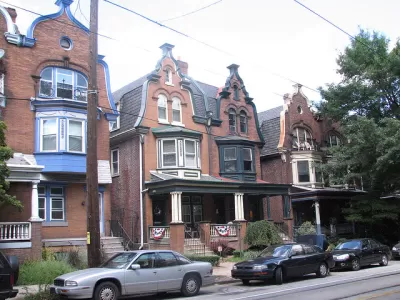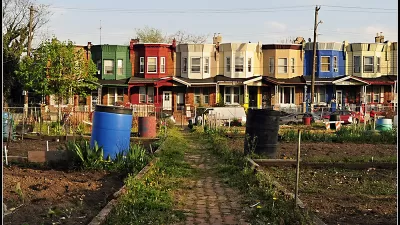Many homes in Philadelphia are in need of repairs, and low-income renters are most affected by substandard housing.

A new study finds that 41 percent of Philadelphia renter households need repairs. The project, a collaboration between PolicyMap and the Federal Reserve Bank of Philadelphia, finds that the cost to repair all occupied units in the metropolitan area is $2.7 billion and for rental units only is $900 million.
Lack of access to quality housing disproportionately affects the city’s most vulnerable residents, say Eileen Divringi and Eliza Wallace. "The poorest households were the most exposed to substandard conditions: Over 55% of the region’s households with incomes below the federal poverty line lived in units in some level of disrepair."
Understanding the reasons for this underinvestment—whether large, corporate landlords are trying to maximize profit or mom-and-pop landlords lack the resources to make repairs, for example—is important, say Divringi and Wallace.
In addition, they point out that considering the consequences of particular policy strategies is essential to ensuring that Philadelphia residents most in need of safe, affordable housing are not displaced. "In what situations would improving the rental housing stock through stepped-up code enforcement destabilize existing tenants and cause an increase in rents? In what contexts would financially assisting cash-strapped landlords with repairs accelerate the up-marketing of previously low-cost units?"
FULL STORY: Study: 41% of Philly area renters live in houses that need repair

Planetizen Federal Action Tracker
A weekly monitor of how Trump’s orders and actions are impacting planners and planning in America.

San Francisco's School District Spent $105M To Build Affordable Housing for Teachers — And That's Just the Beginning
SFUSD joins a growing list of school districts using their land holdings to address housing affordability challenges faced by their own employees.

The Tiny, Adorable $7,000 Car Turning Japan Onto EVs
The single seat Mibot charges from a regular plug as quickly as an iPad, and is about half the price of an average EV.

With Protected Lanes, 460% More People Commute by Bike
For those needing more ammo, more data proving what we already knew is here.

In More Metros Than You’d Think, Suburbs are Now More Expensive Than the City
If you're moving to the burbs to save on square footage, data shows you should think again.

The States Losing Rural Delivery Rooms at an Alarming Pace
In some states, as few as 9% of rural hospitals still deliver babies. As a result, rising pre-term births, no adequate pre-term care and "harrowing" close calls are a growing reality.
Urban Design for Planners 1: Software Tools
This six-course series explores essential urban design concepts using open source software and equips planners with the tools they need to participate fully in the urban design process.
Planning for Universal Design
Learn the tools for implementing Universal Design in planning regulations.
Smith Gee Studio
City of Charlotte
City of Camden Redevelopment Agency
City of Astoria
Transportation Research & Education Center (TREC) at Portland State University
US High Speed Rail Association
City of Camden Redevelopment Agency
Municipality of Princeton (NJ)





























